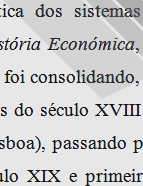

................................
The consolidation and structuring of economic history in Portugal has been duly highlighted by the actions of prominent historians such as Oliveira Martins, Alberto Sampaio, João Lúcio de Azevedo, António Sérgio, Virgínia Rau, Jorge Borges de Macedo, Armando Castro, Joel Serrão, and A. H. de Oliveira Marques. However, other names should also be recalled for their contributions through their research and action to the study of economic facts and the field of economic history, promoting and developing this area within the scope of research and teaching. These include historians José Acúcio das Neves, Rebelo da Silva, Henrique da Gama Barros, Adriano Antero, Francisco António Correia, Artur Águedo de Oliveira, Charles Verlinden, Fernando Piteira Santos, António de Oliveira, and Miriam Halpern Pereira. The development of economic history in Portugal greatly benefited from the interactions of leading historians with cutting-edge historical research in other regions. These close connections with the best practices in various other countries resulted from the high degree of internationalisation of the most prominent Portuguese historians. This was particularly evident from the late 1940s to the early 1970s, with more frequency between 1960 and 1974. Notable figures in this regard include Virgínia Rau, Jorge Borges de Macedo, Vitorino Magalhães Godinho, A. H. de Oliveira Marques, and Miriam Halpern Pereira. These relationships took various forms: participation and presentation of papers at international events, holding conferences, research conducted in research centres, archives, and libraries, or even through extended stays at universities and research centres. Additionally, concerns with the theory, philosophy, and methodology of history, as well as with economic thought—as evidenced in the works of Borges de Macedo, Magalhães Godinho, and Armando Castro—greatly contributed to enriching and strengthening the establishment of economic history during the last phase of the period under study (1950s-60s). In the long process of the formation and consolidation of economic history in Portugal, three phases may be distinguished: Phase 1—late 18th century to the end of the 19th century; Phase 2—the first three decades of the 20th century; and the Phase 3—from the 1940s to 1974. These phases roughly correspond to periods of division in economic thought: "Classical Economics," "Eclectic Thought," "Corporatism," and the "Neoclassical-Keynesian Synthesis" (Carlos Bastien, A divisão do pensamento económico...[The divide in economic thought], 2000).
